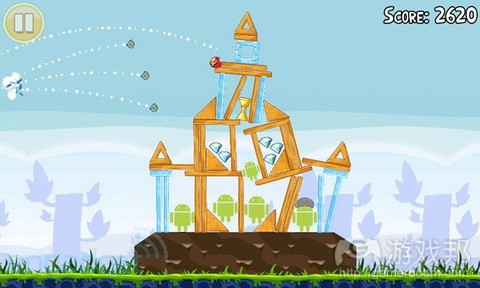手机游戏蓬勃发展 未来态势有待观望
作者:David Hing
新黄金时代
应用商店的出现给手机游戏领域带来革命性变化已不是什么新鲜事,《愤怒的小鸟》和《Words With Friends》等作品在此起到铺平道路作用(游戏邦注:就像《Farmville》给社交游戏领域创造的变化一样)。但随着越来越多开发商和发行商意识到这两个原本备受质疑游戏类型的受欢迎程度,新游戏黄金时代似乎即将到来。
尤其是苹果iPhone和iPad的问世,这极大拓宽玩家族群,将那些原本对玩游戏毫无兴趣的玩家囊括其中。顶级iOS游戏发行商Chillingo的Joe Wee表示这是平台的最大优势:“它挖掘潜在玩家。iOS设备带来全新的游戏市场。”
PlayStation 2和PlayStation 3游戏《Buzz!》的开发商Relentless Software承认iOS如今处在开拓新市场的最前线。Relentless Software CEO David Amor表示,“很多人称自己不是游戏玩家,但调查他们的休闲活动时,你会发现他们其实也玩游戏。这些用户都是碰巧接触到游戏设备。”
此情形也受到iOS开发领域的大量创新举措的推动。和独立开发市场类似,相比业内更加标准化的软件开发模式,iOS的开发费用很少。Amor还将iOS游戏《Quiz Climber》的发行工作同《Buzz!》进行比较。
他表示,“传统视频游戏开发需要很高的投入性。制作PlayStation游戏时,主盘得是Austria,机器要能够消化100万个磁盘,这是非常关键。但手机游戏的制作更加简单明确。”
平台对开发者而言也简单许多,iDevice的开发软件通俗易懂。Chillingo的Chris Byatte表示,“任何富有创造性的人士都能够下载工具,制作游戏。这大大降低准入门槛。”虽然有人批评苹果的审核过程,但Byatte认为用户从中受益匪浅。Wee补充表示,“在更传统的手机市场中,有50%可能,这会行不通。”
投身iOS平台还能够跳过PC开发的某些不利条件,开发者只需关注一个标准化的系统(游戏邦注:虽然现在还有若干SKU)。苹果严格控制设备的一个积极影响是令开发者投身该平台更加容易。Amor表示,“开发者把握各种配置需要耗费近一半精力。将这些时间用于制作新作品,或想出新构思会有趣许多。”
不只有PC市场面临此问题。苹果之外的手机游戏市场也受到设备分散性的影响。Chillingo开始着手瞄准掌上电脑开发内容。Chris Byatte表示,“我们知道推广和补充内容的辛苦所在。这非常微妙,过去提供支持非常费时,现在这些都已不复存在。”
在苹果之前,希望进军手机市场的开发者都得将内容移植至各种平台,然后依靠不稳定的推广中心,从中分成50%(同苹果的70%相比)。Joe Wee将iPhone平台的内容发行形容为手机游戏领域“发现新大陆的时代”,因为它提供嵌入数字推广中心的标准化平台,这对开发者而言非常有吸引力。
iOS的通俗性和普及性不仅带来PC市场的优点,开发者还能够享受到掌机的标准化硬件配置。小型开发团队纷纷涌现;而且繁荣发展,尽管竞争激烈。这些团队创建虚拟工作室,Byatte还谈到Chillingo如何同素未谋面的团队合作,如何实现全球范围内的运作。
泡沫是否会破碎?
回首历史,若这是新黄金时代的开始,那么我们就能够预见结局,我们能够知晓这些小团队何时会消失?我们可以将此称作黄金时代,但这也许已是结局的开始——若这些小团队表现非常杰出,市场已无法满足他们,会出现什么情况?
Byatte表示,“在ZX Spectrum时代,大家在自己的卧室编码——他们或许认识彼此,他们通过邮寄方式出售卡带,但他们现在都变成索尼公司的高管。这就是他们的起步方式。”
Amor同意这点,非常期待看到这些手机开发者会如何重塑游戏行业:“我希望他们继续制作游戏,但他们也可能变成类似于索尼世界的管理者。”
但这是否只是为了表明我们正朝美妙新事物靠近的营销说辞?Byatte和Wee看到市场朝社交领域迈进,他们发现社交元素开始渗入他们的作品。虽然这不一定是消极因素,但这是否会成为新媒介的开端?这带来的是否是新社交游戏混合内容,而非所谓的游戏黄金时代?这是Chillingo所思考的内容。
此外,App store也可能步入缺乏创新的阶段。最近几周,出现许多完全基于他人作品的游戏,如《Free Running 》——App Store平台完全复制《屋顶狂奔》的作品。不难想象各手机平台也出现许多热门《愤怒的小鸟》克隆作品,此外《割绳子》也是最近问世的《Spider Jack.》的主要灵感来源。就连《挖矿争霸》也出现许多iOS克隆版本。在后面这些例子中,借鉴过程合情合理,游戏领域向来常出现迭代内容(游戏邦注:但这意味未来作品也不容乐观)。
另一抑制手机游戏发展的潜在消极因素是游戏的创收方式。寻找从用户身上获得更多收益的途径是这些开发者面临的新问题,因此开始出现“免费增值”游戏或微交易游戏——这个转变引起某些人士的愤怒之情,这类游戏倾向最大限度地基于玩家创收。
Wee表示,“选择正确的游戏模型对开发者而言非常有挑战性。你需要顾及游戏的体验方式,要让用户认可游戏价值,愿意为之掏钱。这算不上一个问题,但显然我们还能够选择其他很多创收模式,满足用户体验iOS免费游戏的愿望。”
至于什么造就新iOS黄金时代的杰出游戏,一致看法似乎是难以定义的“优化”功能。Byatte表示,他合作的很多开发者都希望尽快发行自己的应用,但他建议大家腾出3-6周的优化和测试时间,去除各种不协调的元素,发现漏洞。他表示,“这是个痛苦的过程,因为多数人都希望快点开始创收,但我们认为既然已全力以赴,就不要让努力付之东流。”
同时,Amor建议优化游戏的核心机制,避免出现功能累赘现象。“大家想要的是能够迅速把握的核心机制,我觉得游戏开发者倾向持这样的心理,‘现在我还可以添加什么内容?’,其实多数时候你已无需添加任何元素。”
应用市场创造完美的开发环境,游戏行业的下个创新有望从这里诞生。仅2-3年时间,这里已涌现大量游戏作品,远超过掌机游戏的数量,虽然这是否是泡沫经济,我们还得继续观望。(本文为游戏邦/gamerboom.com编译,拒绝任何不保留版权的转载,如需转载请联系:游戏邦)
A New Golden Age of Gaming
by David Hing
A New Golden Age of Gaming
It’s not news that the app store has been revolutionary for mobile gaming, with titles such as Angry Birds and Words With Friends paving the way, just as Farmville has for social gaming. Increasingly, though, with developers and publishers seeing both of these previously ridiculed areas of the industry suddenly surging in popularity, it seems like a new Golden Age of Gaming may be on the horizon.
Apple’s efforts with the iPhone and the iPad in particular have opened up the market to people who otherwise wouldn’t have shown any interest in playing games. Joe Wee of Chillingo, one of the leading publishers of iOS games, singled this out as the greatest strength of these platform, saying: ‘It brings out the hidden gamer in everybody. That’s the magic that iOS has brought to an entirely new gaming market.’
Relentless Software, responsible for the Buzz! games on the PlayStation 2 and PlayStation 3, agrees that iOS is currently at the forefront of this effort to open new markets. ‘I had a lot of people that would say they weren’t gamers, but then when you quiz them on what they do, they do play games,’ said David Amor, Relentless Software CEO. ‘People almost accidentally have a game device in their pocket.’
The situation has been helped by the great deal of innovation in iOS game development too. Much like the indie market at large, the overheads are minimal compared to the more standard models of software development seen in the industry. Amor illustrated as much when comparing the process of bringing his upcoming iOS title Quiz Climber to market with the stress of getting Buzz! to launch on the PSP and PlayStation 3.
‘Traditional video game development requires a massive commitment’ he says. ‘In the case of making a PlayStation game, your master disc is going to Austria and there’s a machine there that stamps out a million discs and that’s a big thing to take on. This is much more straightforward.’
The platform is also very easy for a developer to work with and the development software for the iDevices is highly accessible. ‘Anyone who is creative can download that and just hammer out a game,’ says Chillingo’s Chris Byatte. ‘It’s opened the doors to everyone to reach the market.’ Although some have criticised Apple’s approval process, Byatte believes it’s highly beneficial to the consumer. ‘In the more traditional mobile market, there’s a 50 per cent chance that it won’t even work,’added Wee.
Developing for iOS also bypasses a significant drawback of PC development, which is that developers only have to worry about one standardised system (albeit now with a few SKUs). One positive aspect of Apple’s strict control over the uses for its device and how it can be modified is that development for it is much simpler. ‘So much energy as a developer is soaked up figuring out different configurations,’ says Amor. ‘You’re spending half your energy worrying about that, and it would be much more fun spending that energy on making a new game or coming up with new ideas.’
It’s not just the PC market that suffers from this. The mobile gaming market outside of Apple is also affected by the diversity of the hardware currently in use. Chillingo started out developing for Pocket PC (now known as Windows Mobile). ‘We know the pains of delivering content and provisioning,’ said Chris Byatte. ‘It’s tricky, and in the old days providing support was very time consuming and really, that has gone now.’
Before Apple, developers wanting to sell in the mobile market would have to port titles to many different platforms and then rely on shaky distribution centres, only to earn 50 per cent of the revenue (compared to Apple’s 70 per cent). Joe Wee described the release of the iPhone as a ‘Eureka moment’ in mobile gaming, as it offered a standardised platform with a built-in digital distribution centre that was attractive to many developers.
The accessibility and ubiquity of iOS appears to offer the benefits of the PC market, but also the benefits of working with the homogenised hardware configuration of a console. Small teams of developers aren’t just prospering in the market; they’re thriving, despite the fierce competition. These teams are setting up virtual studios, and Byatte tells us how Chillingo is working with teams that have never even met each other face to face, or are operating on different sides of the globe.
Could The Bubble Burst?
Looking to history, if this is in fact the beginning of a new golden age, then the end could already be forecast in terms of where these small teams might end up. We might label it as a golden age now, but it could already be the beginning of the end – what will happen when these small teams are so successful that they outgrow the market?
‘You had the ZX Spectrum days where people were back-bedroom coders – they probably know each other, and they’re selling cassettes by post, but those guys are now execs of the Sonys of the world,’ says Byatte. ‘That’s how they started out.’
Amor agrees, with a hopeful eye on how this rush of mobile developers could reshape the industry: ‘I’d like them to continue making games, but why not have those people be the people that run the Sonys of the world in the future?’
However, is this just marketing bluster to state that we’re on the brink of something new and wonderful? Byatte and Wee see the market moving towards the social market, and they’re seeing a lot of social elements cropping up in the games on which they work. Although this is not necessarily a negative factor, could this be the beginning of a new medium entirely? Rather than a golden age of gaming, could this be the birth of a social media/gaming hybrid? It’s something Chillingo is carefully considering.
Not only this, but it could be that the App store has reached a point where innovation could be arguably as less prevalent. In recent weeks there have been cases of games being submitted that are entirely based on someone else’s work, such as Free Running – a literal clone of Canabalt that has appeared on the App store. It’s also no big surprise that the massively popular Angry Birds is seeing a number of imitators popping up across all mobile platforms, while Cut the Rope has served as a significant ‘inspiration’ for the newly released Spider Jack. Even Minecraft clones are popping up on iOS. In the latter cases, this is perfectly legitimate inspiration, and iteration has always existed in the game industry, but it could also be a worrying sign of what’s to come.
Another potential negative that could hold mobile gaming back is the way in which the games are funded. Finding ways to extract cash from players is a new problem for these developers, and it’s seen the birth of ‘freemium’ games, or games featuring micro-transactions – a move that some have reacted to angrily and which is prone to exploitation.
‘It’s challenging for developers to basically choose the right model for the game,’ says Wee. ‘You need it to fit well with how the game plays and how consumers perceive they will deride value from it and indeed pay for it. It’s not necessarily an issue, but there are definitely more opportunities and new monetisation methods with consumers’ desire to play free-to-play games on iOS.’
As for what makes a great game in the new golden age of iOS gaming, the consensus seems to be that it’s a near-indefinable feature known as ‘polish’. Byatte says that a lot of the developers with which he works want to get their app released as soon as possible, but he often recommends another three to six weeks of polish and playtesting to help iron out the kinks and identify bugs. ‘It can be a painful process because a lot of these guys just want to start making money, but we say you’ve gone all this way, don’t throw it out to the winds,’ he says.
Meanwhile, Amor recommends refining the core mechanic of any game and advises against feature creep. ‘People want a core mechanic that they can understand quickly, and I think game developers have a habit of saying “alright, now what could I add?” and most of the time you shouldn’t add anything at all.’
The app market provides the environment for a perfect storm of development and it’s possible that the next big innovations in gaming will come from there. In just two or three years, it’s already amassed an enormous gaming library, far in excess of that of some consoles, although it still remains to be seen whether or not this is just a bubble that’s about to pop. (Source:bit-tech)
上一篇:解析《无尽之剑》游戏机制设计特点
下一篇:分享手机游戏制作各阶段的注意事项










































 闽公网安备35020302001549号
闽公网安备35020302001549号